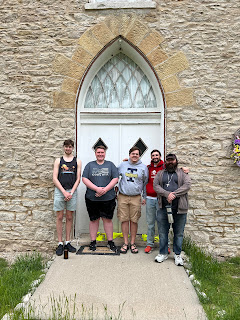Friday of the Fourth Week of Easter
Pilgrimage to the Baptismal Site of the Venerable Servant of God Augustine Tolton
Dear brothers,
We find a distressing entry in the baptismal register of this church on May 29, 1854. It reads as follows: “A colored child born April 1, 1854, son of Peter Tolton and Martha Chisley, property of Stephen Elliott; Mrs. Stephen Elliott, sponsor” and is signed by Father John O’Sullivan. No first name is given this child in the register, but we, of course, know him to be the Venerable Servant of God Augustine John Tolton.
What are we to make of the fact that his name is not recorded? It shows what the society of his day considered important: the slave was often overlooked, and yet the slave was not unimportant enough to be entirely forgotten; there is still a record of the baptism having taken place. Such a moment could not be forgotten, for it was a moment when God intervened in our human history.
When he concluded the diocesan phase of the Cause for the Beatification and Canonization of Father Tolton, the late Francis Cardinal George said, “History is what God remembers; the rest passes.” God remembers that on that day he said to the slave boy Augustine Tolton, “You are my son,” when he was washed in the saving waters (Psalm 2:7). God remembers that it was on this very site that the word of salvation was sent to him, a word that echoed throughout this life (cf. Acts 13:26).
The inscriber of that baptismal record may not have remembered young Gus’ name, but his name was known to God even before his conception in Martha Jane’s womb (cf. Jeremiah 1:5). It was on that day that God said to that infant boy, “I will never forget you” (Isaiah 49:15). Because Mother Church has lifted him up as one worthy of our veneration and imitation, we must never forget him, either.
Indeed, we might say his very name was a foreshadowing of the necessity of his remembrance because, as the ancient Romans said, nomen est omen (the name is a sign). The name Augustine comes from the Latin augere, meaning “to increase.” More specifically, the Latin form of the name is Augustinus, meaning “venerable, majestic, magnificent, noble.” The name John comes from a Hebrew name meaning “God is gracious.”
Considering these two names, we might say that because of God’s goodness, he said to the young Tolton in this place, “It is too little … for you to be my servant… I will make you a light to the nations, that my salvation may reach to the ends of the earth” (Isaiah 48:6).
We have gathered here in this place touched by God because the light of Father Gus’ life has spread not just to the ends of the earth, but even across the decades. Neither virtue nor holiness are bound by time because they are what God remembers, the lives of his holy ones being bound as they are with the life of the Son of God. Is this not the great mystery of Baptism, of incorporation into the only Redeemer of mankind who took on “the form of a slave, coming in human likeness” (Philippians 2:7)?
As we look to the heroic virtue of Father Gus and strive to walk with him along the path of holiness, may we learn from him to “serve the LORD with fear, and [to] rejoice before him” (Psalm 2:11). May he teach us that what the world remembers is not important, but only what God remembers; the world may forget us, but God will not. Amen.



No comments:
Post a Comment